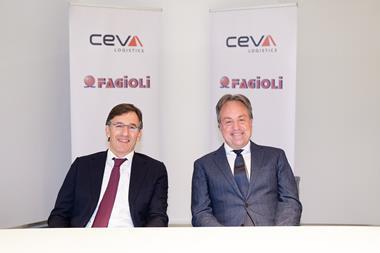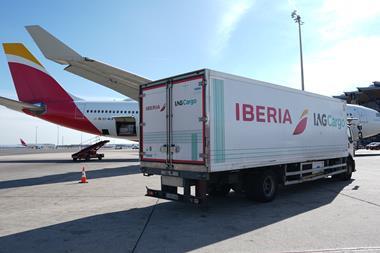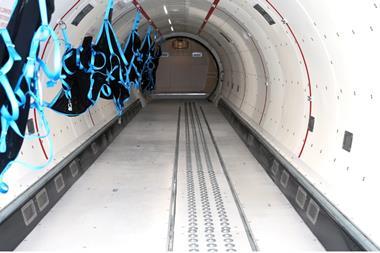BARIG has been speaking for Germany’s airlines for 65 years – and cargo is a key part of its role, as Ivan Santoro and Michael Hoppe tell Peter Conway.
Europe’s biggest national airline association turned 65 on June 8, with a celebration attended by 250 representatives from air traffic control, cargo and logistics. BARIG — the Board of Airline Representatives in Germany — boasts over 100 members and has been around since 1951.
Unlike some other airline groups, it takes cargo activities very seriously, as is shown by the fact that Michael Hoppe, chairman and secretary general of BARIG, is also co-chairman of its cargo committee. The other cargo committee co-chairman, appointed in early April, is Ivan Santoro, regional operations and ground handling director Europe, Middle East and Africa for AirBridgeCargo Airlines (ABC).
The cargo committee is divided into three sub-committees, focusing on charges, security and infrastructure respectively. Though these mirror the committees that BARIG has on the passenger side, as Santoro points out, they tackle very different issues.
“Many airline groups are very passenger-driven,” he says. “They discuss how many check-in counters or baggage trolleys are needed.
“But at BARIG we think cargo carriers should have a voice too.
“Cargo’s needs are very different from passenger. We also make the point that cargo carriers are as important as passenger ones to airports and contribute as much to them.”
Issues for the cargo committee include noise regulations, security, infrastructure constraints, charges and the drive to automate processes.
Charges mean more than just landing fees, important though those are. BARIG challenges all sorts of charges levied on airport users to test whether they are, in fact, justified. A new German Aviation law, passed in 2012, helps here as it requires those levying charges to show where the money is being spent, and how it is being allocated between aviation and non-aviation users.
“We are now able to question charges much better than we could before; to know, for example, why we have to pay and not other people,” Hoppe remarks.
He points out that, historically, when both airports and airlines were often state-owned, this was not an issue. “But now airlines are privatised, we have to look closely at the money we spend and to make sure that it is justified.”
One result of BARIG’s efforts, he says, was that a planned increase in airport charges last year at Frankfurt airport was cancelled.
“We asked why the increase was necessary and went into it in some detail, and the result was that they could not get approval from the ministry. This year we have just started negotiations, so we will see what happens.”
Although not a direct party to the negotiations, BARIG also supported forwarders and handlers in a battle against fees at CargoCity South at Frankfurt. Hoppe says that there were lots of charges, some levied on a bilateral basis between service providers, and that there was a general lack of transparency.
“It got bigger and bigger and we had more and more fees. Some of them were levied for historical reasons and no one knew why,” he says.
Santoro concurs: “We fought hard and joined with forwarders and cargo handlers and finally got rid of this cost structure. Things are much simpler now and more transparent.”
Despite this, Hoppe insists that airlines are not against new or increased charges, if there is a solid justification for them. “If it is clearly explained what is behind them, then we can accept them. If we have to pay without knowing what we are getting, then it is not a good story.”
BARIG also takes an active part in discussions about the future development of Cargo-City South. It does this through Air Cargo Community Frankfurt, the body bringing together all cargo companies on the airport which was established in 2014.
Hoppe serves on its executive board.
The idea is to look at the needs of all different players – airlines, forwarders, handlers and truckers – and then present them to airport operator Fraport with a coherent voice. Topics on the table include ground handling improvements, the digitalisation of air cargo processes and the construction of a new third passenger terminal at the airport, which air cargo players obviously want achieved without disruption to their operations.
Santoro says that BARIG sees its role in this as setting the framework by having preliminary discussions with airport authorities, to find out the limits of what is possible and what is not possible. It presents these findings to Air Cargo Community Frankfurt, which then works out the practical proposals.
“They are the executing body, as they know about local operations. They can get all parties together, agree what procedures need to be put in place, and then put them to Fraport and get the problem solved.”
BARIG’s cargo work does not just concern Frankfurt.
Santoro highlights rapid development at Munich, which is raising its own cargo infrastructure issues, and says that Hamburg and Berlin are also facing constraints.
“Obviously, a big part of cargo moves through Frankfurt, but it is not limited to Frankfurt,” he says. “There are a lot of initiatives at Munich which we are following and supporting and trying to influence as much as we can.”
One other big issue for all-cargo operators at Frankfurt in recent years has been the night time curfew, which became absolute between 11pm and 5am when the airport’s fourth runway opened in 2011.
However, this is now a fact of life that the cargo industry active there just has to live with. “Big manufacturers don’t have to close at night, but this is a constraint that is forced on us,” Hoppe observes. “But it is the law and we have to accept that.”
It sounds as if cargo carriers are – more or less – managing to do that. Santoro says that freighter operators do face some difficulty in getting slots on peak days, “but we don’t get too many complaints from our members about that”.
BARIG is involved in other noise reduction measures at Frankfurt. These include using vortex generators to reduce noise on landing, altering flight paths and the speed and angle of descents, and having noise breaks on particular runways late at night or early in the morning.
The latter involves concentrating all traffic on one or two runways to give inhabitants near the others a break.
A trial of this concept has been underway for a year and has produced an implementation rate of over 90%.
But Hoppe says that BARIG also works to ensure that airlines can fully use the hours when landings are permitted. “We take our responsibility to people around the airport seriously, but that should not mean we have limits on our operations when the airport is open,” he says.
On a broader front, BARIG supports the move towards a European Single Sky, a common air traffic control for Europe, but says progress on that has been too slow.
Currently, groups of European countries pool their sovereignty in Functional Airspace Blocks, or FABs. But BARIG wants faster progress toward a true single sky, pointing out the advantages that the US enjoys from having such a thing.
The organisation is also campaigning for the European Union (EU) to suspend its carbon trading scheme for airlines until the International Civil Aviation Organization produces global rules, something that is supposed to happen in September.
Faced with global opposition in 2012, the EU suspended plans to make all airlines in its airspace join its carbon trading scheme and instead confined it to intra-European flights. But it has threatened to implement its original scheme from next year if progress on an international scheme this year is seen as inadequate.
BARIG opposes this and says that the current intra-European trading also puts its carriers at a disadvantage, pointing out that Gulf carriers can operate feeder flights for their long-haul services without this restriction.










